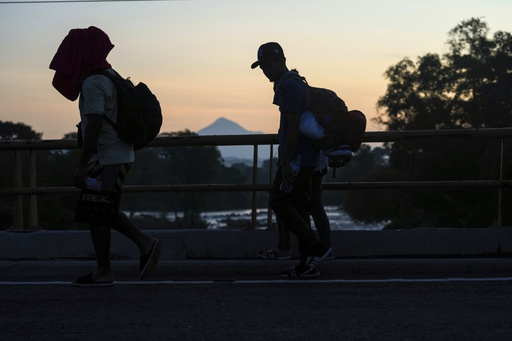
MEXICO CITY — The outcome of Donald Trump’s election as U.S. president has significantly altered the dynamics for countless migrants and those contemplating migration worldwide. However, the impact may not align with Trump’s intentions.
While Trump has voiced his commitment to curtailing immigration, experts warn that tightening the already scarce legal avenues for entry into the U.S. is likely to push migrants to rely increasingly on smugglers. This shift could lead individuals to engage more with organized crime networks that are reaping substantial profits from human smuggling operations.
Individuals affected by these changes come from various countries, many of whom have already liquidated their assets to finance their journeys. Although the number of Venezuelans arriving at the U.S. southern border has decreased, it remains significant. In September, Mexican nationals accounted for half of all arrests made by U.S. Border Patrol. Meanwhile, migrants from China often travel through Ecuador en route to the Americas, and Senegalese travelers frequently take multi-stop flights to Nicaragua before continuing northward.
According to the United Nations’ International Organization for Migration, the global number of international migrants stands at approximately 281 million, representing about 3.6% of the total population. The organization’s report indicates a growing trend of displacement driven by political instability, economic challenges, and violence, leading to an increased demand for asylum. It emphasizes that when conventional paths are inaccessible, individuals tend to resort to perilous, irregular routes.
During Trump’s first term, Mexican border cities were overwhelmed with migrants, which allowed cartels to exploit their vulnerability—kidnapping, extorting their families for ransom, and coercing some into joining their ranks. Migrants faced daunting waits—sometimes years—for their U.S. asylum cases to be processed while remaining stuck in Mexico.
The introduction of the CBP One program by the Biden administration in early 2023 brought a semblance of order to the situation, allowing migrants to schedule appointments remotely via their smartphones instead of needing to physically appear at the border. This development led to a decrease in the number of overcrowded border shelters as many sought to pursue legal avenues for entry.
Trump has vowed to dismantle the CBP One program, revive restrictions on refugee resettlement, and has consistently threatened mass deportations during his campaign.
For those already en route to seek refuge in the U.S., Trump’s victory offered a significant source of concern but did not necessarily deter their plans. On election night, Bárbara Rodríguez, a 33-year-old Venezuelan, found herself among a group of 2,500 migrants traversing southern Mexico. Instead of resting, she was glued to reports about the U.S. elections on her smartphone.
Having previously monitored opposition polling in Caracas, Rodríguez faced harassment from the pro-government factions after the July elections. “I had to leave the country because my family’s lives were in danger,” she explained. After selling her home in September and leaving her three children in the care of her mother, her aspiration to wait for a CBP One appointment to request asylum now carried urgency. “We have until Jan. 20,” she stated, indicating the date of the new administration’s inauguration, acknowledging the possibility of hiring a smuggler instead.
Martha Bárcena, who served as Mexico’s U.S. ambassador throughout much of Trump’s first term, underscored that migrants often bear the brunt of his immigration policies, a scenario that could repeat itself. “Organized crime benefits immensely from these policies, as the profits from human trafficking can rival or surpass those from drug trade,” Bárcena noted.
Estefanía Ramos from Guatemala expressed her fears while sheltering in Ciudad Juarez, directly opposite El Paso, Texas. In tears, the 19-year-old recounted her and her husband’s perilous journey after they fled their homeland due to gang threats. With their newborn daughter in tow, they had already been waiting three months for a CBP One appointment and were hesitant to risk illegal entry.
Meanwhile, many asylum seekers were seen waiting calmly in Ciudad Juarez, hopeful for their turn to cross into the U.S. As part of her advocacy, Gretchen Kuhner, the director of a Mexican legal services NGO, encountered families living rough in Tuxtla Gutierrez as they awaited appointments that could determine their fate.
Kuhner described how these families struggled in harsh conditions, clamoring to charge their phones daily to check on their appointments while managing basic needs. “These individuals are striving to follow the proper legal procedures,” she observed.
Mark Hetfield, CEO of a U.S.-based refugee support organization, raised alarms that tightening the already stringent processes would leave vulnerable populations with limited options for safety. “Many countries in this region lack a robust asylum system or haven’t ensured safety for those who receive it,” Hetfield remarked.
Concerns were further amplified by fears of mass deportations, echoing previous threats from Trump that ultimately did not materialize. However, the apprehension remains real, particularly regarding the potential for deportations to nations like Cuba and Venezuela, complicated by fraught diplomatic relations. Advocates from Haiti have called on nations, including the U.S., to suspend deportations amid ongoing domestic turmoil.
Mexico stands to face the brunt of these policy shifts, with about 11 million Mexicans residing in the U.S., nearly half of whom lack legal status. The remittances sent back to Mexico, surpassing $63 billion last year from the U.S., underscore the economic impact of such actions. The repercussions of mass deportations could plunge families into financial instability, challenging Mexico’s ability to absorb returns.
Migrant advocates have raised alarms over the lack of preparation among Mexican government officials to handle a sudden influx of deportees. Rafael Velásquez García, the Mexico director for the International Rescue Committee, expressed concern that current Mexican aid organizations lack the resources to support such large numbers.
Carlos Pérez Ricart, an international relations professor at CIDE, emphasized that Mexico must brace itself for the influx of pressures stemming from the potential Trump administration’s policies. “Our nation may become a holding area for migrants against its wishes,” he warned, projecting that mass deportations could become a reality under Trump, who aims to halt migrant flows into the U.S.
